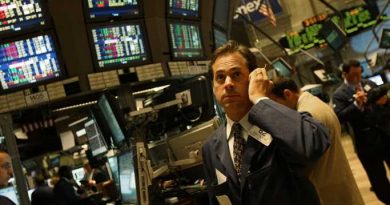FTSE 100 drops as commodity stocks weigh; Ultra Electronics jumps
(Reuters) – London’s FTSE 100 on Monday recorded its worst session in nearly a month, as weakness in commodity prices hit heavyweight energy and mining shares, while Ultra Electronics jumped after it agreed to a takeover deal.
The blue-chip FTSE 100 ended 0.9% lower, dragged down by miners, energy stocks, and financials.
BHP Group fell 1.8% after the world’s biggest miner said it was in talks to sell its petroleum business to Australia’s top independent gas producer Woodside Petroleum.
“Some investors may be worried that BHP is selling at a bad time, owing to the uncertain economic outlook, forecasts in some quarters of $100-a-barrel oil in 2022, and the substantial number of oil and gas assets that are potentially up for sale,” Russ Mould, investment director at AJ Bell said in a note.
The FTSE 100 gained 10.6% so far this year and recovered nearly 29% from its October 2020 lows, helped by dovish central bank policies and optimism related to the reopening of economies.
Fears that the recent spike in global coronavirus infections and growing inflationary pressures could prompt central banks to pull back support have restricted further gains, leading the FTSE 100 to underperform most of its developed market peers.
In the UK, investor focus this week will be on latest unemployment, retail sales, and inflation numbers.
Ultra Electronics Holdings jumped 5.9% to touch record highs after defence firm Cobham said it agreed to buy the company in a deal valuing its UK-listed rival at 2.57 billion pounds ($3.56 billion).
Oil majors BP and Royal Dutch Shell were among the top drags tracking weaker crude prices on the back of dour economic data from China, the world’s second-largest economy.
Oil stocks underperform FTSE 100 since March
The domestically focussed mid-cap index eased 0.3%, with travel and leisure stocks leading declines on rising uncertainty related to travel demand.
Helping limit losses, Future Plc jumped 5% to the top of the mid-cap index after the British media company said it would buy Dennis Publishing Ltd for 300 million pounds ($415.4 million).
Source: Read Full Article

